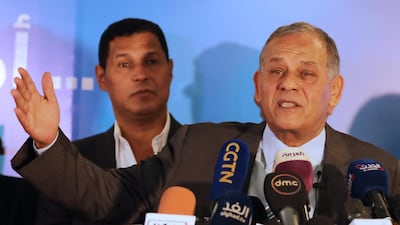Another contender for Egypt's presidency dropped out of the running on Monday with Mohammed Anwar Sadat, leader of the liberal Reform and Development Party, saying he saw no possibility of fair race against the incumbent, Abdel Fattah El Sisi.
Mr El Sisi has yet to formally a re-election bid but banners bearing his image and boasting of his achievements have sprouted up all over Egypt in recent days.
"The security [apparatus] and bureaucracy will make my life and the lives of my supporters difficult not only in the election, but also in our civil society activities and initiatives," Mr Sadat told The National. "The window for the 2018 election is closed."
The nephew of former president Anwar Sadat was ejected from his parliament seat last February after being accused of leaking to foreign embassies a draft legislation to limit the activities of non-profit civil society groups. The law was later adopted, drawing criticism from Egypt's western allies including the United States, the United Kingdom and Germany.
Announcing his decision at the Reform and Development Party's headquarters in Heliopolis, just three kilometres from the Ittihadiya presidential palace, Mr Sadat alleged that the administration had already violated the polling rules and procedures published by the National Electoral Commission last week.
One of the commission's stipulations was that presidential aspirants needed to submit their applications between January 20 and 29, which includes the process of collecting endorsement from at least 20 MPs or 25,000 voters.
"Government officials started collecting signatures from civil servants in ministries and other government institutions asking President Sisi to run for another term before opening the door for the nomination process, which is a big violation," Mr Sadat said.
The only remaining probable candidates are Mortada Mansour, an MP and chairman of Zamalek Sporting Club, one of Egypt's biggest football teams, and former army chief Sami Anan, whose candidacy was announced last week by the Arabism Egypt Party founded by him.
Mr Mansour has positioned himself politically as a nationalist to the right of Mr El Sisi, vowing to block social media channels such as Facebook to control public discourse and to take unspecified measures against Ethiopia's Grand Renaissance dam across the Nile.
Former prime minister Ahmed Shafiq backtracked last week on his announcement that he would run, saying he had realised he was "not the ideal candidate to lead the country's affairs in the coming period".
Khaled Ali, a leftist lawyer and opponent of the handover of the Tiran and Sanafir Red Sea islands to Saudi Arabia, has said he will run but may be disqualified over his conviction for offending public decency by making a rude gesture while celebrating a court decision against the transfer.
Another contender, army colonel Ahmed Konswa, was sentenced to six years in jail for declaring his candidacy, which violated a rule forbidding active duty military personnel from seeking political office.
"Mohammed Anwar Sadat was the most progressive candidate," said Mohamed Soliman, 26, a student leader of the January 2011 uprising and an Open Society Foundation graduate scholar at Georgetown University. "He worked in civil society for years and has good connections with the outside world,"
But even Mr Sadat’s potential supporters acknowledge that his pluralistic, environmentally oriented platform was unlikely to attract a majority of voters.
Still, they lament that Egyptians' choices were so severely constrained just seven years after the Tahrir Square uprising that overthrew autocratic president Hosni Mubarak.
"It is sad that elections in Egypt seem to have returned to the old days, when it was just a referendum on the president," said Mr Soliman.
While the Ittihadiya Palace has made has yet to make a direct reference to the presidential race, Mr Sisi announced on Twitter on Sunday that he would convene a two-day conference in Cairo on Wednesday to highlight his accomplishments and take questions directly from citizens.
““Together we will review the path of success,” the president tweeted.
___________
Read more:
Ex-army chief to run in Egyptian presidential election
Egypt sets election date as potential El Sisi rivals are elbowed out of the race
Former Egyptian prime minister retracts bid for presidency
___________

